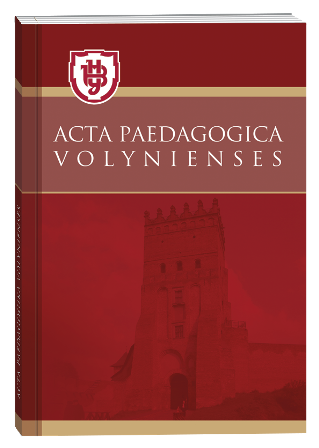INTEGRATION OF RHETORIC IN THE MODERN SYSTEM OF TEACHING PHILOLOGICAL DISCIPLINES
DOI:
https://doi.org/10.32782/apv/2024.4.23Keywords:
integration, rhetoric, philology, philological disciplines, rhetorical competence.Abstract
The relevance of the selected aspect of the research is determined by the requirements for changes in society, taking into account the requests of stakeholders, the interests of students and the educational standards of the European Union regarding the development of communicative and rhetorical competences of students of higher education. Special attention is paid to the formation of rhetorical competence of future philologists, which is an important component of their professional training. The article states that rhetoric, which has traditionally been part of the educational process, today needs revival, as it contributes to the development of effective communication skills necessary for successful professional activity. The ways of integrating rhetoric during the study of philological disciplines in order to increase the level of communicative training of students are analyzed. The methodological basis of the research was the theoretical and methodological work of linguists, psycholinguists, and philologists, who emphasize the importance of developing communicative and rhetorical skills in philology students. These scientists emphasize that rhetorical competence is the foundation for the successful professional activity of a philologist. The authors of the article also analyzed modern approaches to the integration of rhetoric into the educational process. The article notes that the integration of knowledge in higher education should be implemented not only at the level of disciplines, but also in the learning process itself, which requires a revision of traditional approaches to teaching. The integration of rhetorical knowledge into educational programs will enable future philologists to develop their professional skills at a higher level and be competitive in the labor market. The article draws balanced conclusions. It is emphasized that teachers should go beyond the traditional approach to teaching and apply interdisciplinary approaches that will help students acquire the knowledge and skills necessary for the modern world.
References
Великий тлумачний словник сучасної української мови / уклад. і голов. ред. В. Т. Бусел. Київ : Ірпінь : ВТФ «Перун», 2009. 1736 с.
Постанова Кабінету Міністрів України від 3 листопада 1993 р. № 896 «Про Державну національну програму «Освіта» («Україна XXI століття»)». URL: http://zakon.rada.gov.ua/laws/show/896-93-п (дата звернення: 26.09.2024).
Ранюк О. П. Розвиток риторичних умінь майбутніх філологів у процесі навчання польської мови : дис. на здобуття наук. ступеня канд. пед. наук : [спец.] 13.00.02 «Теорія та методика навчання»; Київ. ун-т ім. Бориса Грінченка, [Хмельниц. нац. ун-т]. Київ, 2020. 365 с.
Сагач Г. М. Риторика: Навч. посіб. для студентів середніх і вищих навч. закладів. Вид. 2-ге, перероб. і доп. Київ : Видавничий Дім «Ін Юре», 2000. 568 с.
Усатенко Т. П. Інтеграція змісту освіти та навчання мови. Українська мова і література в школі. 1990. № 11. С. 49–53.
Oxford Advanced Learner’s Dictionary of Current English / Sixth Edition ; ed. by Sally Wehmeier. Oxford : University Press, 2000. 1540 p.







